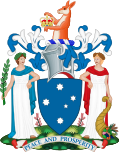East Melbourne Hebrew Congregation
1857 establishments in AustraliaEast Melbourne, VictoriaGerman-Australian cultureOrthodox synagogues in AustraliaReligious organizations established in 1857 ... and 6 more
Renaissance Revival synagoguesSynagogue buildings with domesSynagogues completed in 1860Synagogues completed in 1877Synagogues in MelbourneUse Australian English from January 2015

The East Melbourne Hebrew Congregation (Hebrew: ק"ק מקוה ישראל, romanized: Mickva Yisrael), also known as East Melbourne Shule, East Melbourne Synagogue, Melbourne City Synagogue or City of Melbourne Synagogue is a historically significant Jewish congregation in East Melbourne, Victoria, Australia. The synagogue, consecrated in 1877, is the oldest in Melbourne.
Excerpt from the Wikipedia article East Melbourne Hebrew Congregation (License: CC BY-SA 3.0, Authors, Images).East Melbourne Hebrew Congregation
Albert Street, Melbourne East Melbourne
Geographical coordinates (GPS) Address Phone number Website External links Nearby Places Show on map
Geographical coordinates (GPS)
| Latitude | Longitude |
|---|---|
| N -37.80926 ° | E 144.97415 ° |
Address
Melbourne City Synagogue (East Melbourne Hebrew Congregation)
Albert Street 488
3002 Melbourne, East Melbourne
Victoria, Australia
Open on Google Maps









